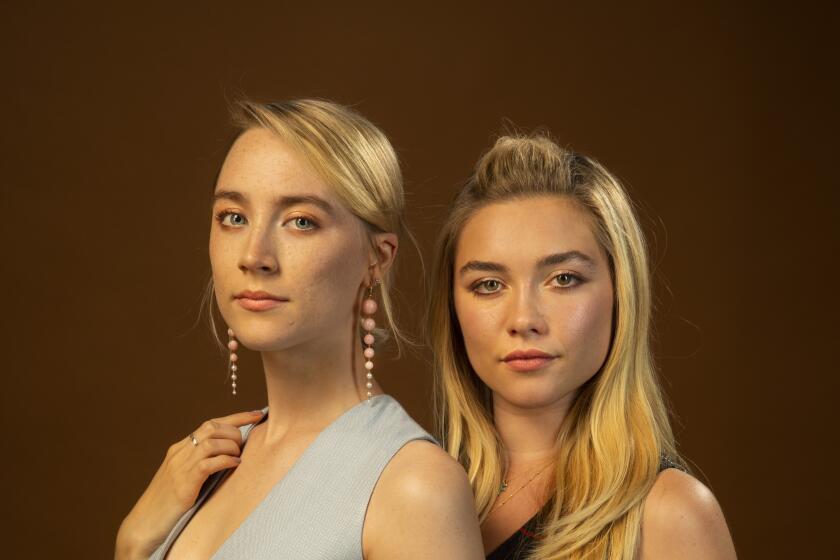In the snow with Greta Gerwig at the places that inspired ‘Little Women’
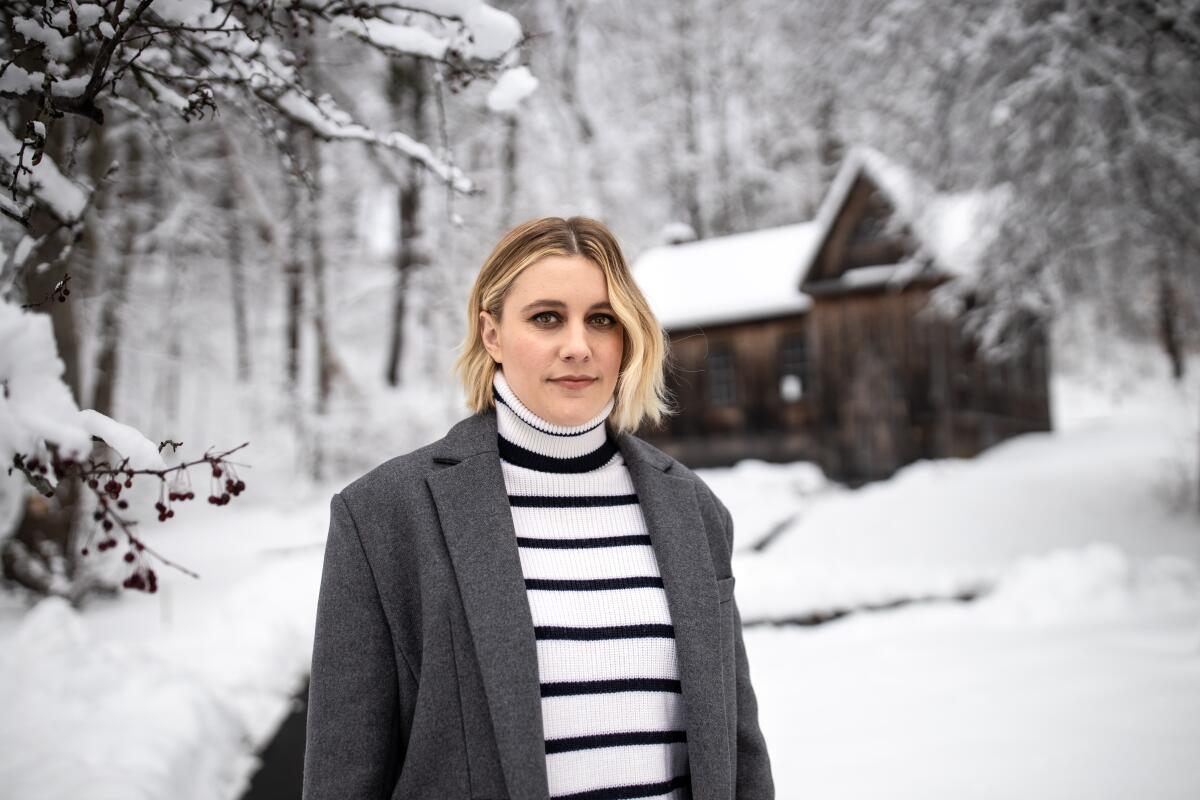
- Share via
CONCORD, Mass. — Greta Gerwig surveyed the white expanse in front of her, the freshly fallen snow still untouched.
“I’m just going to go for it,” she said, forging a path through the powder in her Dr. Martens.
She clutched the leash of her mini Bernedoodle, Wizard, who dutifully trotted alongside her. Together they trudged toward the North Bridge, where the minutemen first faced British soldiers at the start of the Revolutionary War. When she reached the arch, she paused, taking in the quiet and the cold. The river below her was nearly still, the branches on the maple trees bent from the weight of the snow.
“It looks like a winter wonderland,” Gerwig said, her breath forming a cloud.
Nearby, her infant son, Harold, had been fed and was napping under the watchful eye of a caretaker. Her fiance, the director Noah Baumbach, was in Europe, promoting his own new movie, “Marriage Story.” For this moment, she was alone with nature, with the spirits of the writers and thinkers who made this sacred ground.
When Gerwig decided she wanted to make her own version of Louisa May Alcott’s “Little Women” — out Christmas Day — the first thing she did was come here, to New England. As a child of Sacramento, where the temperature virtually never dropped below 40 degrees, she’d romanticized the frostbitten storybook lands inhabited by her literary heroines, Jo March and Anne of Green Gables.
“This bridge, even, had such proximity to where Louisa lived, and it’s where Ralph Waldo Emerson’s grandfather watched the war start,” Gerwig said. “Walking the paths that they might have walked, or the ground they might have sat on — it gave me some sense of permission to dramatize it because I’m making it real again, hopefully.”
In many ways, I think Jo March allowed me to be who I was, and I think she gave that same permission to a lot of other women.
— Greta Gerwig
Growing up, Gerwig had an active imagination that often made it difficult to distinguish between fiction and reality. Alcott’s novel, about four sisters struggling to reconcile their hearts’ ambitions with financial obligations, felt so deeply personal to her that she couldn’t differentiate her own desires from the lead character’s.
“I don’t know if I wanted to be a writer and that’s why I liked Jo, or if Jo wanted to be a writer and that made me want to be a writer,” explained Gerwig, 36. “I know I was ambitious and competitive and I had a temper, and I know Jo had all of those things. In many ways, I think Jo March allowed me to be who I was, and I think she gave that same permission to a lot of other women. She made a certain type of young girl feel like she had a place.”
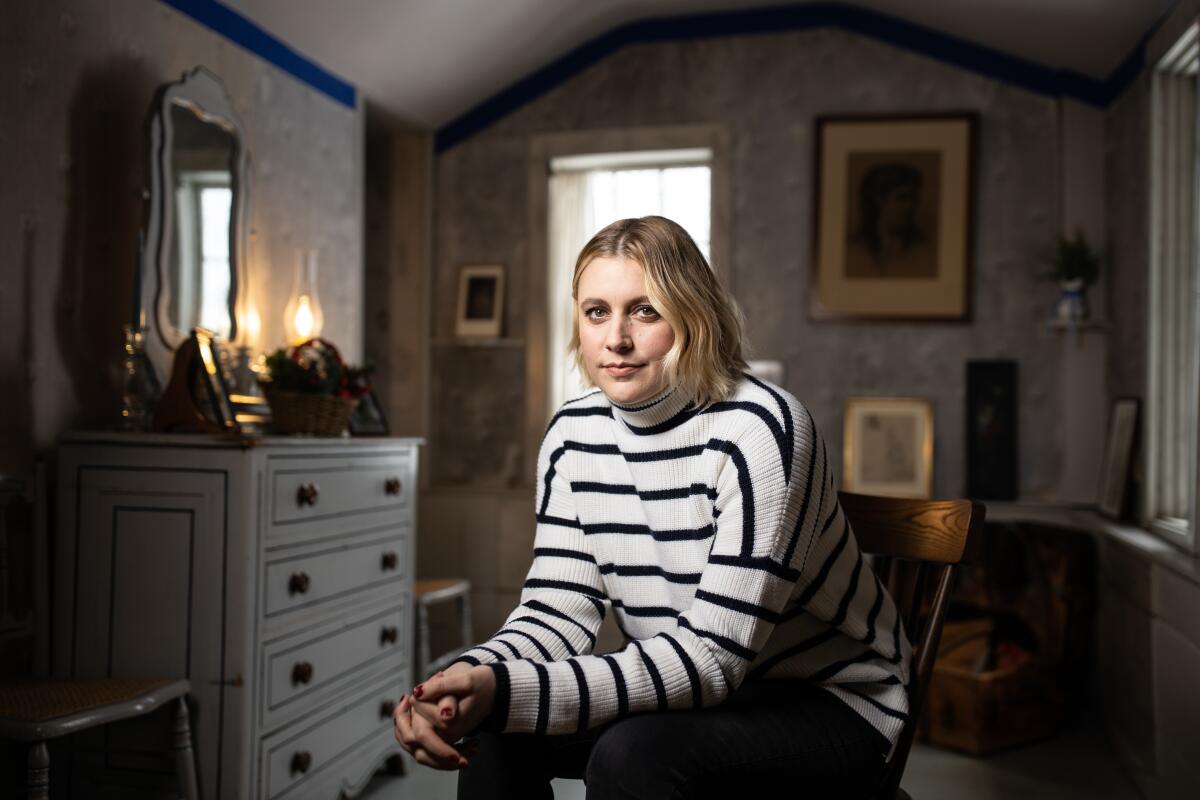
Jo, played in Gerwig’s adaptation by Saoirse Ronan, is the girl in “Little Women” whom most young readers aspire to be even if they do not wholly understand why. She prizes her family above all else, cutting off her long hair — her “one beauty,” Alcott writes — and selling it to help her father recover from an illness. She is unconcerned with vanity and spends late nights toiling away on a novel in the attic. She frequently laments that she is not a boy. And, perhaps most memorably, she turns down the proposal of the handsome, wealthy and charming Laurie (Timothée Chalamet) because she wants to stay true to her heart.
It is Gerwig’s take on “Little Women,” though, that elucidates the connection between Jo and Alcott. At the urging of her publisher, who felt no 19th century woman would sympathize with a purposefully unmarried woman, Alcott gave Jo a husband at the end of “Little Women” — not Laurie, but a quirky German professor. In her own life, however, the author remained a self-proclaimed spinster. She began writing the famous novel when she was 35 — the same age Gerwig was when she directed “Little Women” — and proudly remained without a husband or children until her death two decades later.
For most of her life, Gerwig felt a real connection to this ethos. In high school, she often found herself wishing she was a boy because the writers she idolized — primarily Tom Stoppard — were men.
She wasn’t concerned about getting married, though as a teenager she did conjure up a fantasy of her dream wedding, which involved her surrounded by a tap-dancing chorus of 100 men in tuxedos and top hats. (“It was really a musical theater number, is what I wanted,” she said, laughing. “It wasn’t really about a wedding.”)
At Barnard College, she finally started to learn about and admire important female creators. She also met her version of the Alcott sisters — five women she still considers her best friends — and became so attached to the idea of a female utopia that she found it difficult to accept them growing up before she was ready to.
“There was this sense of wanting to freeze the moment and not let it get beyond that,” she said, walking back to a car waiting for her outside the park. “I’m happy that everybody grew up. But there’s a part of me that still connects to how much I wish we could all just stay living together — us as a little tribe. And there are treasures to be had, but only if you are willing to accept reality. I mean, now I sound like Jo: My friends got married, so I had to figure something out.”
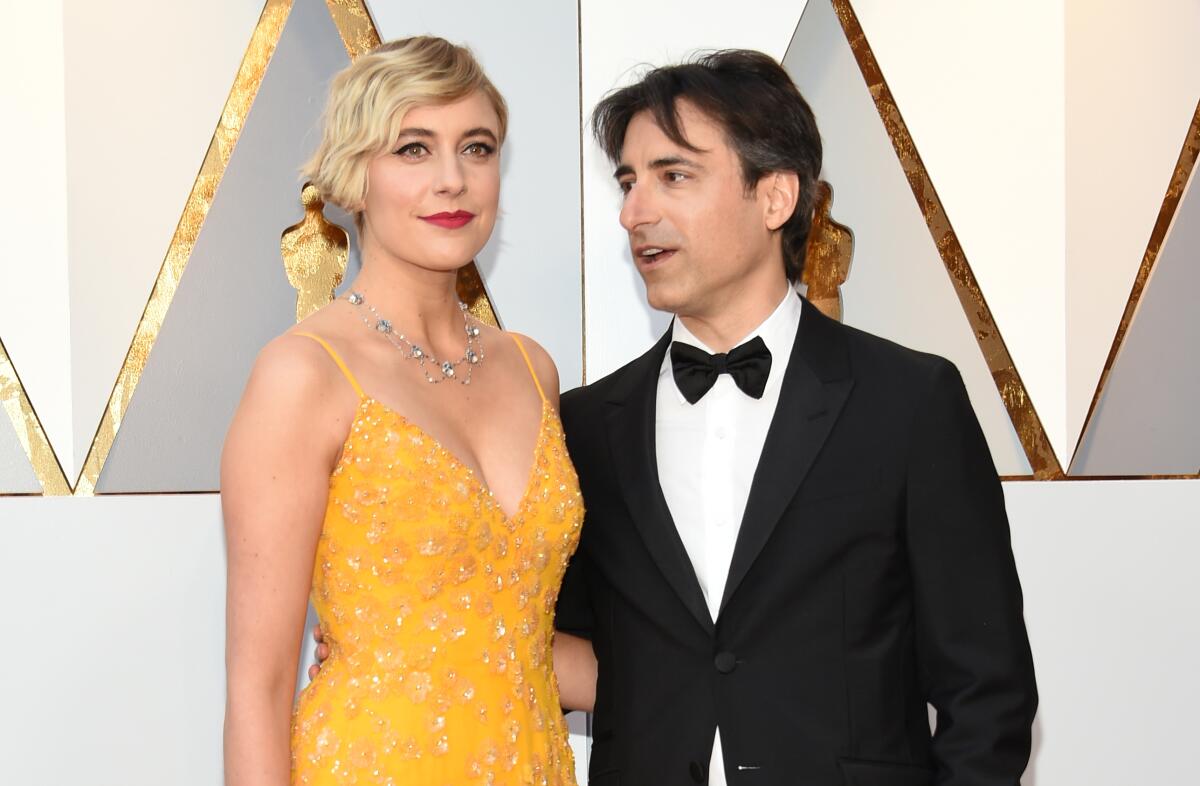
Just as Gerwig was beginning production last year on “Little Women” — the first studio film she’d ever directed — she found out she was pregnant. Unlike Alcott, whose financial obligations dictated her choices, the filmmaker was enjoying personal and professional highs simultaneously. But she kept the news to herself throughout filming, hiding her growing stomach underneath bulky layers in the winter chill.
“It’s wild and beautiful, and I’d love to say, ‘Wouldn’t it have been glorious to know?’ — frankly, just so we could have been part of that ride with her,” said Laura Dern, who plays March family matriarch Marmee in the film. “But unfortunately, knowing what I know — I worked with a director on a movie who was told to ‘please not nurse’ because the crew would consider it a sign of weakness. From my experience in this business, Greta was absolutely right to keep it to herself, and that sucks.”
“She told me after the fact that she didn’t want anyone to treat her any differently,” added Ronan. “And people would have done. Because she works around the clock. She’s such a workhorse. And when a woman is pregnant, everyone always questions, ‘Are her decisions sound?’ and all this sort of stuff.”
As she climbed back into an SUV, kicking the sleet off her boots, Gerwig said her decision to keep her pregnancy private wasn’t as calculated as the actors surmised. Once she passed the three-month mark, she was so deep into filming that her focus was on making her days.
“I would like to think it would have been just fine [if they knew],” she said. She noticed the driver consulting a piece of paper and asked to see it. It was an e-mail from a Sony Pictures publicist outlining a list of local filming locations to stop at.
“Yeah, no, I’m just gonna direct you to the next spot, if that’s cool,” Gerwig said. She got out her iPhone and put ‘Walden Pond’ into Google Maps. Every Sunday while filming “Little Women,” she said, she would visit the spot where Henry David Thoreau wrote his manifesto about a life in the woods. (During the six months she spent here last year, she also lived in Thoreau’s family home, which once doubled as a pencil factory.)
It just seemed like second nature to her because she’s incredibly assured. She knows exactly what she wants.
— Timothée Chalamet on Gerwig’s transition to a bigger budget with “Little Women”
At Walden Pond, she would mentally run through her shot list for the week, shadowboxing her way through the upcoming scenes as she walked. She thinks best when she’s moving, she explained, but acknowledged that the treks served as spiritual guidance, too. When her actors arrived in Massachusetts, she urged them to connect with the Transcendentalist thinkers of Alcott’s time by gifting them a variety of literature: an annotated copy of “Little Women,” “Walden,” Virginia Woolf’s “A Room of One’s Own” for Ronan, and Charles Baudelaire poetry for Chalamet.
“She was so in touch with the material,” recalled Chalamet, who first met Gerwig on the set of her 2017 directorial debut, the far-lower-budget “Lady Bird.” “There were so many more people on set this time — you could feel the machine, and the production had gotten larger. But it just seemed like second nature to her because she’s incredibly assured. She knows exactly what she wants.”
Gerwig has said that she was inspired to make “Little Women” because she wanted to bring out the theme of money in Alcott’s book. One of the most triumphant moments in the film is when Jo — whom the filmmaker views as a sort of hybrid with Alcott herself — insists on keeping the copyright to “Little Women” before selling the novel to a publisher.
“She had the combination of being an artist and a businesswoman that I find stunning,” said Gerwig. “I think Quentin [Tarantino] has a deal where he gets his movie back after 50 years or something. I would imagine before Lucasfilm sold to Disney, George Lucas owned those characters — those are his IP. Saoirse has talked about Taylor Swift not owning her own back catalog and this new album is the first one she’s actually owned. So Louisa doing what she did in that way at that time — I can’t even believe it.”
Sony gave Gerwig a reported $40 million to make “Little Women,” a sum that allowed her to shoot on celluloid and build a full-scale replica of Orchard House, which does not allow filming because it is a museum. Because she’d always identified with the story as “a superhero origin story of girls who wanted to make things,” she wanted to give it grand scope.
“I remember one day we shot Jo running through the street, and the film was running through the camera and there were all these extras and I thought, ‘Hot damn, this is moviemaking, and I’m photographing a girl running,’” Gerwig said with a laugh. “There are all the bells and whistles, and it’s just a girl booking it. And that’s enough.”
Despite overwhelmingly positive reviews, however, Gerwig was not recognized for her screenplay or directing when the Golden Globe nominations were announced earlier this month. In fact, the Hollywood Foreign Press Assn. — which decides on the awards — did not give nods to any female directors this year, despite the fact that some of the year’s most critically acclaimed films were made by women.
“I’m right there with you — I’m bummed,” admitted Gerwig. “There was beautiful work done this year by women, and I want them to get trophies. If I knew the answer, I would fix the thing. But the work’s being done. It’s happening. It is changing. It is.”
It’s a film for everyone ... I’m so tired of this ‘women’s movie’ stuff. It’s such a joke.
— Laura Dern on the perception men won’t see “Little Women”
It remains to be seen how “Little Women” will fare with moviegoers, though some critics have suggested that the film is suffering from the perception that it is only for females.
“The ‘Little Women’ problem with men is very real,” New York Times critic Janet Maslin tweeted last week. “I don’t say that lightly and am very alarmed. In the past day have been told by 3 male friends who usually trust me that they either refuse to see it or probably won’t have time. Despite my saying it’s tied for #1 of 2019.” (Times critics Justin Chang and Kenneth Turan both also included the film in their top 10 movies of 2019.)
Dern is fearful that this viewpoint may take hold, too. She’s been trying to spread the message that the film is a “man’s movie” because it shows not only how one becomes a man, but how to grow into a man while also supporting women.
“It’s a film for everyone,” the actress said. “I’m so tired of this ‘women’s movie’ stuff. It’s such a joke.”
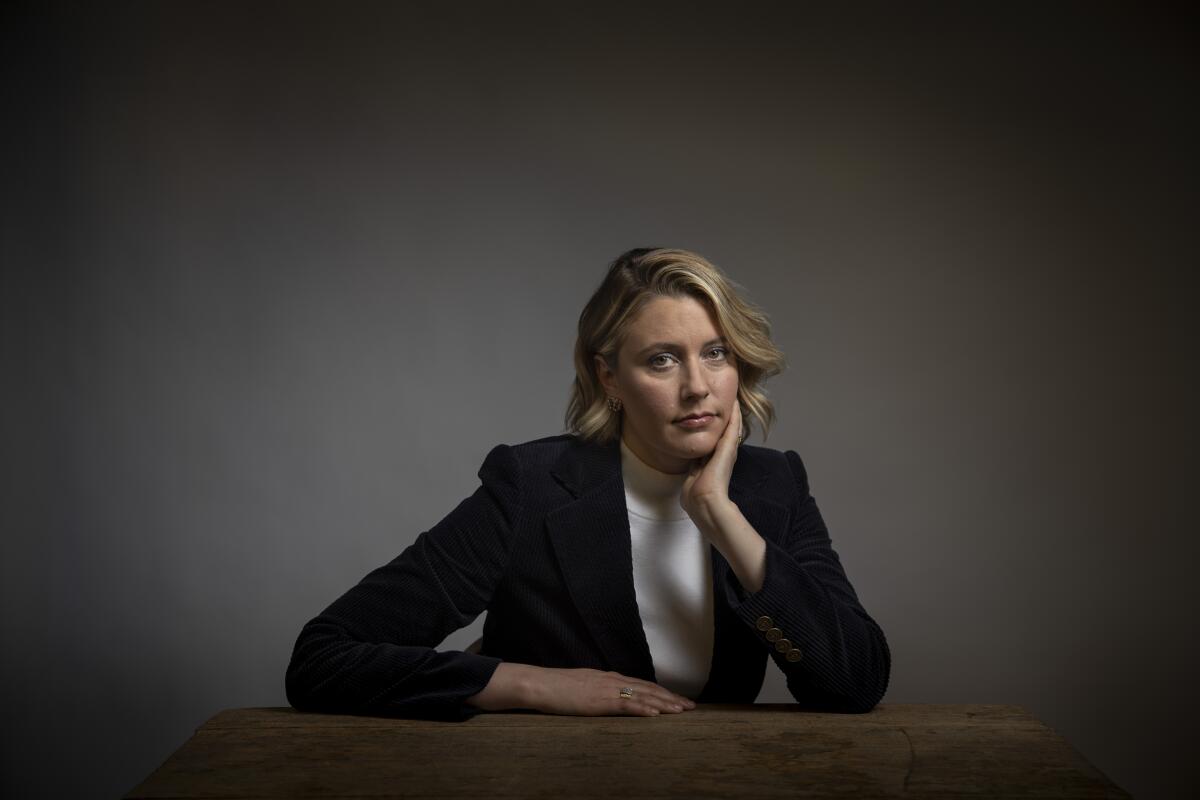
No matter how the film fares, Gerwig already has her next move plotted out: starring in an off-Broadway production of Anton Chekhov’s “Three Sisters” this spring. Returning to acting — which she hasn’t done since 2016’s “20th Century Women” — was a move encouraged by Tracy Letts, who played Ronan’s father in “Lady Bird” and now plays Jo’s salty publisher in “Little Women.” The actor advised Gerwig: “What better thing could you do for your writing and directing than spend three months measuring yourself against Chekhov? That will make you better.”
Gerwig’s car arrived back at Orchard House, and she immediately raced inside and up the stairs to show off her favorite bits of the house. The floorboards of the home, purchased by the family patriarch in 1868, creaked as she strode purposefully from one sister’s room to the next. She was like a girl proudly showing off her own childhood home to a new friend during their first sleepover. There were the owls and calla lilies sketched onto the wooden wall planks by Abigail May Alcott — the sibling who inspired Amy March. The knee-high suede boots Louisa May Alcott wore during the sisters’ homegrown theatrical productions. The aged copies of George Eliot’s “Middlemarch” the writer kept in her bookcase.
“And this is the family china,” she said, inching toward a cabinet when she was stopped by a stern looking tour guide.
“Excuse me,” the officiant warned, noticing the coffee in Gerwig’s hand. “You can’t have drinks in here.”
It was a stark reminder that Gerwig does not, in fact, live at Orchard House, even if she feels like she grew up there.
“I definitely invaded this house and this narrative to the point where it occupied my dreams,” said Gerwig. “Which is the way that something really feels like it’s yours, because it’s in your conscious. The floor plan, the corners, the objects of the house — all of it is really in there. These felt like my sisters that I grew up with.
“I think young Greta wouldn’t believe it,” she said, looking around the home. “I think she’d be proud that I found a voice as a writer and a filmmaker, and I found a way to get that into the world. I always wanted to, but I wasn’t always certain that I could — that I was worthy of it. So I hope she’d be proud.”
The latest version of the classic novel soars with director Greta Gerwig and star Saiorse Ronan
Greta Gerwig reinvents the literary classic “Little Women” with Saoirse Ronan as a formidable Jo and Florence Pugh as a vibrantly complicated Amy.
More to Read
Only good movies
Get the Indie Focus newsletter, Mark Olsen's weekly guide to the world of cinema.
You may occasionally receive promotional content from the Los Angeles Times.

